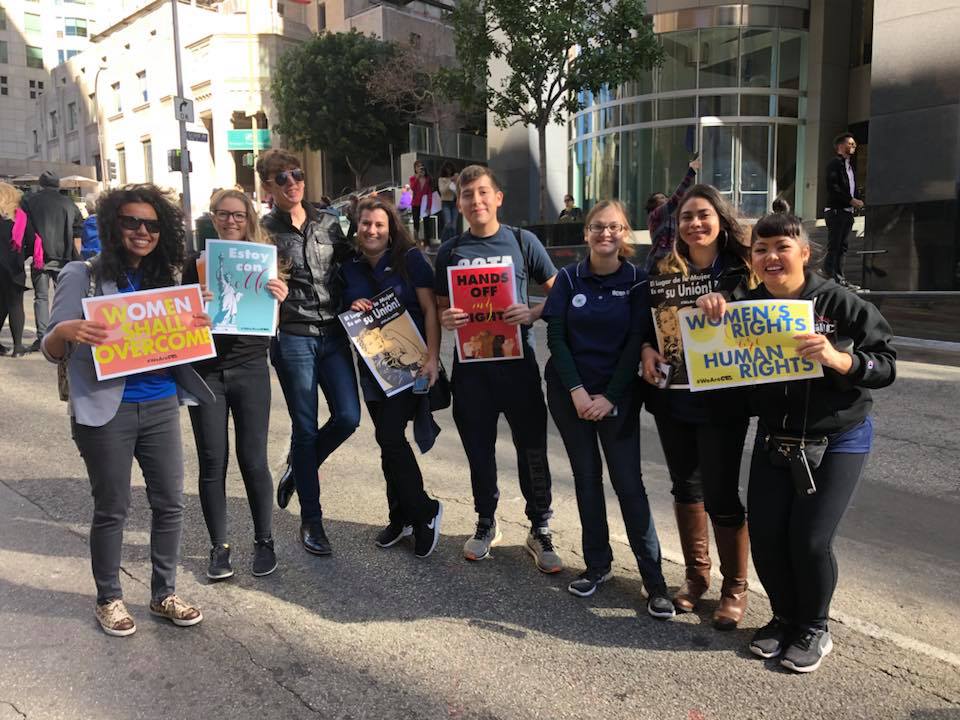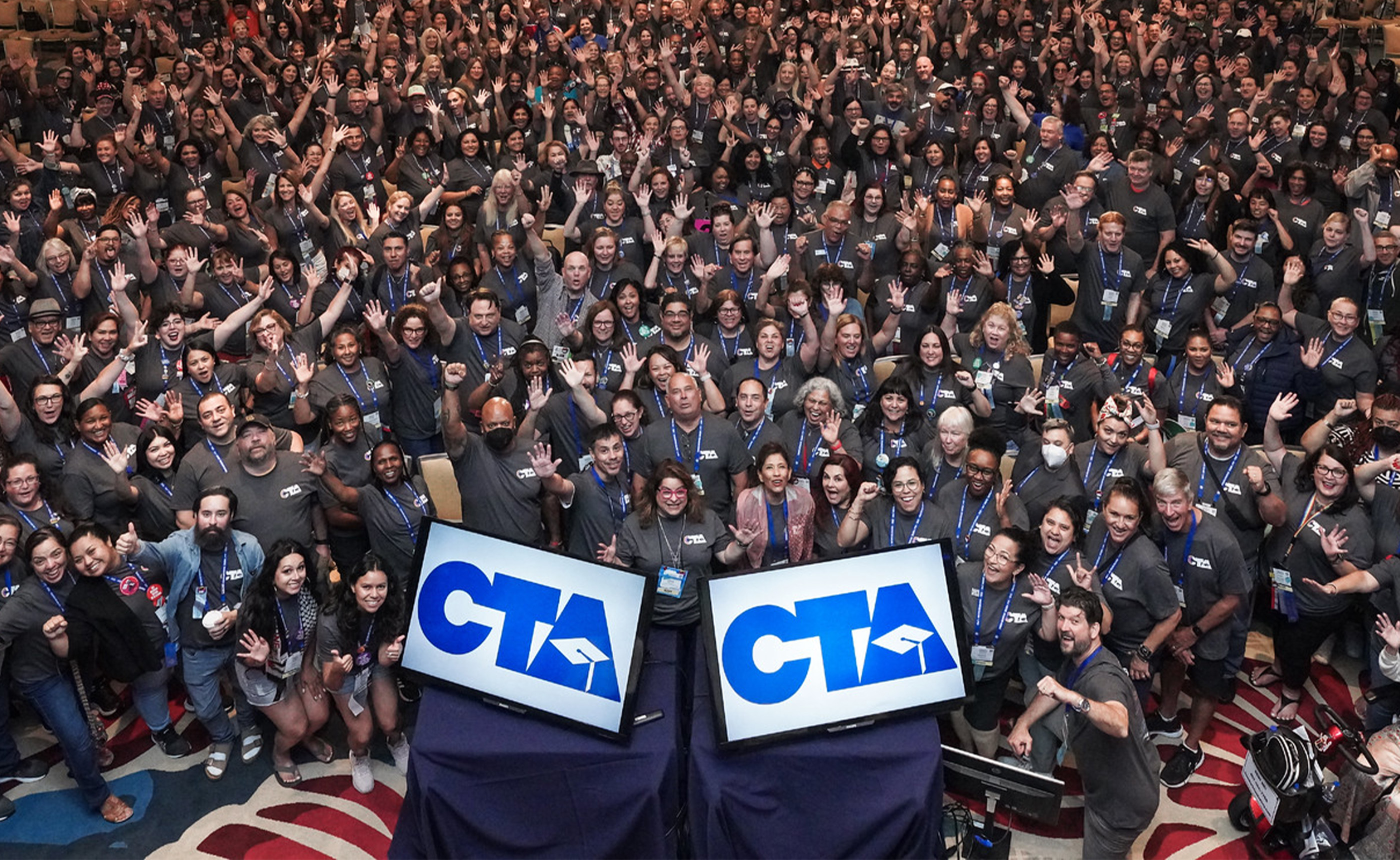Planning Activities for Your Student CTA Chapter
When planning chapter activities, consider developing events around four major areas:
Teacher Quality
Membership Recruitment
Community Outreach
Political Action
Teacher Quality
- CPR certification. Hold CPR certification training for members.
- Partner with other campuses. Community colleges and four – year colleges/universities can develop partnerships to educate members about transfer information, testing and requirements for credential programs. SCTA chapters can also work together in developing events for their members.
- Teacher panel. Present a panel of teachers to discuss and answer questions on a variety of issues (i.e. new teachers support programs, how to prepare for a sub, etc). Contact your local CTA office for possible contacts to be part of the panel.
- Workshops. Schedule a workshop or mini-conference for members. Include food and a raffle prize. This can also be used as a membership recruitment tool by offering it free to those who join SCTA. For more information, see Planning a Workshop.
- Speakers. Ask faculty, community members or CTA staff to speak on a variety of education issues.
- Videos. View an education-related video after a business meeting followed by group discussion. For example, show the “Teach!” documentary film about the life of first year teachers in Los Angeles. Contact the SCTA office to check-out a copy.
- CBEST study group. Set up a study group to prepare for the CBEST or other required tests.
- Portfolio day. Students can get together to work on their resumes and teacher portfolios. Be sure to include SCTA activities in your portfolio.
- Book club. Establish a book club where members develop a reading list and participate in reflective journaling activities.
- Field experience. Develop tutoring or reading programs at a local school. Members will gain valuable experience through these programs.
Membership Recruitment
- Personal contact. Members join because they are invited to participate. Building relationships and one-on-one contact is the key to recruiting new members, retaining existing members and creating successful chapters.
- Tabling. Set up a table and answer questions at club day, freshman orientation and other campus events. Contact the SCTA office for brochures, newsletters, magazines and other items to distribute. Hold a raffle among those who submit membership forms/checks and provide 1 free membership, SCTA merchandise or other prize.
- Meetings. Include speakers or presentations immediately after your regular business meetings. This will encourage more participation of members who don’t want to just attend meetings. Encourage members to each bring a friend.
- Plan events. Plan workshops, trainings or community service events for SCTA members. Advertise the event is free to anyone who joins SCTA. See Planning a Workshop for more information.
- Schedule a visitation. SCTA Executive Board members and staff are available to visit your campus and present information about SCTA.
- Address classrooms. Ask instructors and professors for a few minutes to talk about SCTA in your classes.
- School newspaper. Request that an article about SCTA and your chapter be included in school newspapers.
- Develop a web page. Chapter web pages can be linked to the SCTA website. If you do not have a web page, SCTA can post information on your behalf.
- Flyers. Post flyers and announcements in all departments (not just liberal studies and education departments).
- Display. Develop a bulletin board or display where SCTA membership brochures are stocked. Ask permission to include in the counseling office, faculty advisor’s office or other departments.
- Socials. Sponsor a beginning of the year or end of year social (ice cream social, pizza party, etc.,) for new and prospective members.
Community Outreach
- Develop partnerships with community organizations. Connect with Big Brother/Big Sisters, food banks, women’s shelters, cultural centers and other local community organizations to provide services to children and families in your area.
- Mentoring/tutoring. Contact a local CTA office or chapter in your area for assistance in determining a “school of greatest need.” Work with the school in developing or assisting with an existing mentor or tutorial program for at-risk students.
- Connect with Club Ed: Teachers for Tomorrow programs or Teacher Academies at middle schools and high schools in your area. (Club Ed is a kit provided free of charge to CTA members at middle schools and high schools to assist them in developing a future teacher club). Provide campus tours, speak at club meetings, etc.
- Book drive. Contact a local CTA office or chapter in your area for assistance in determining a “school of greatest need.” Hold a book drive and provide a raffle prize to those who donate. Or, hold fundraisers and purchase books for the school.
- Read Across America. Plan events to celebrate Dr. Suess’ birthday. Read Across America is held each year in the beginning of March. Read to students at a local elementary school. Plan reading events at libraries and malls. Donate backpacks with books and school supplies to underprivileged children. Develop programs for middle school and high school students to read to younger children.
- Outreach to Teach! Develop a school clean-up or beautification project modeled after the NEA Student Program’s “Outreach to Teach.” This may include painting classrooms, graffiti removal, landscaping, etc. Include students, parents, teachers and the community.
- Support scholarships. Raise funds and donate to the CTA Martin Luther King Jr. Memorial Scholarship Fund and/or the CTA César Chávez Memorial Education Awards Program. For more information about these funds, view CTA Scholarships.
- Day of the Teacher. Teacher Appreciation Week and Day of the Teacher are held in May each year. Plan events to celebrate the importance of teachers and education.
- Campus volunteer coordinator. Contact your campus volunteer coordinator or community outreach office to invite someone to speak at a meeting. They can provide resources for community outreach projects.
- Local Schools. Develop partnerships with local schools and have members volunteer.
Political Action
- Voter registration campaign. Many issues affecting public education are political in nature, so encourage students to participate in the democratic process by registering students to vote. Set-up voter registration tables on campus.
- School board elections. Contact a local CTA chapter in your area and provide assistance in school board and other local elections by phone banking, precinct walking, etc.
- Educate members and the community about any current issues affecting the quality of teaching and learning in public schools. Initiate letter-writing campaigns to state representatives, editorials to the media, etc. (i.e. high stakes student testing, teacher testing, class size reduction, lack of due process rights for new teachers, the teacher shortage, vouchers, etc.)
- Invite local politicians. Ask local politicians to speak at your chapter meeting and discuss current educational issues.
- Support pro-education candidates. Contact your local CTA office for information about candidates in your area. Also, check the CTA magazine, California Educator for CTA positions on issues and candidate endorsements.
- Conferences. Send a representative from your chapter to CTA/SCTA and other education conferences or events to get information about “hot issues” in education and report back to the chapter.
- CTA Service Centers. Contact your local CTA Service Center Council (SCC) and get on the mailing list for meetings (usually 4 per year). SCC meetings are a forum for interaction among teacher leaders to discuss issues affecting education. (For information about your Service Center, contact the SCTA office).

